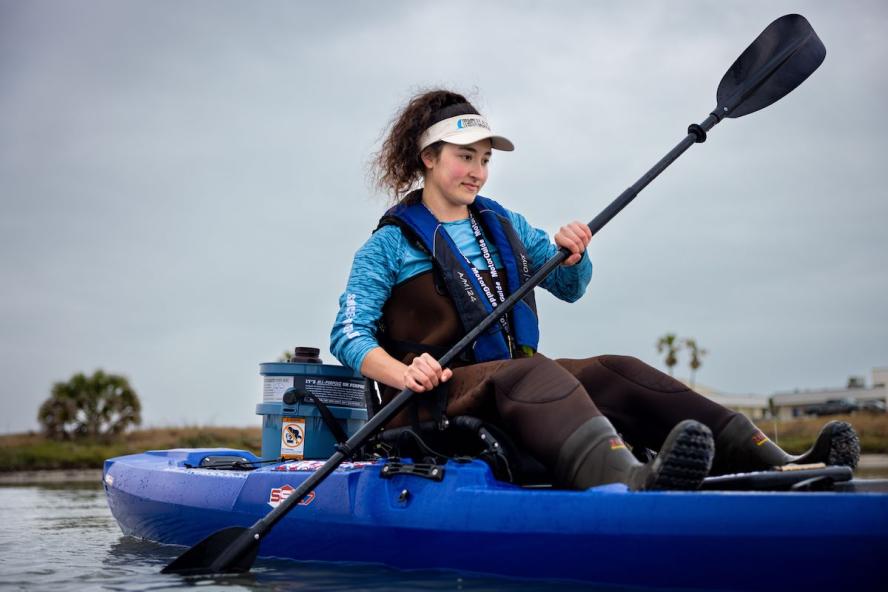-
About
- Leadership & Faculty
- News & Events
-
Academics
- Graduate
- Advanced Clinical Training
- Continuing Education
- Academic Departments
- Academic Offices
- Simulation Experiences
-
Student Life
- Offices
-
Research
-
Hospitals & Clinics
- Emergency Care
- Hospital Services
-
Community Outreach
- Volunteer
Committed to Coastal Waters
NOAA Scholar Susana Gonzalez, VG22, pursuing a Ph.D. in coastal and marine system science

While growing up in Downey, California (a Los Angeles suburb), Susana Gonzalez, VG22 (ella/she/her), was captivated by marine life.
“I thought whales, specifically orcas, were incredibly charismatic creatures. It felt mythical to me, knowing they explored the depths of the ocean, some places where people hadn’t been yet,” she says. “As my curiosity for animals broadened, I considered veterinary medicine as a career option.”
Gonzalez earned a B.S. in animal science, pre-veterinary medicine from California Polytechnic State University, San Luis Obispo, and learned more about where her passion resided. “Through courses and internships, I realized I was interested in the health of animal populations and their intricate relationship with the environment.”
This steered her career away from veterinary medicine and back toward marine life and conservation medicine, “where I could still help animals, but from a different angle,” she says.
Throughout her academic career, Gonzalez held several jobs. Although they were not directly associated with her long-term goals, she credits these positions in the service industry with helping her develop skills in time management, conflict resolution, and public speaking.
Prior to enrolling as a graduate student, Gonzalez served as a veterinary nurse assistant in San Luis Obispo. “It was my first time working without also being in school, allowing me to think clearly about what type of long-term career I wanted.”
She was drawn to the Master of Science in Conservation Medicine (MCM) program at Cummings School of Veterinary Medicine at Tufts University by its focus on One Health. “Tackling world problems with an understanding that the health of animals, humans, and the environment are all connected intrigued me,” she explains. “I knew I would be challenged by the advanced format of the program, which would help me grow professionally.”
On campus, Gonzalez was mentored by her faculty advisor, Dr. Jessica Sparks, VG14, a course director for the MCM program and an assistant professor in the Department of Infectious Disease & Global Health. “She was approachable for both academic and personal issues and cared deeply about the success of her students,” she says. “Her dedication was inspirational, and she provided me with helpful tips to structure my life and enabled me to become a better student.”
In addition to an M.S. in conservation medicine, she completed a graduate certificate in water: systems, science & society from Tufts Institute of the Environment. The knowledge she gathered as a graduate student helped her form a research idea, and with the help of Dr. Sparks she developed a research proposal and acquired funding through a fellowship from Tufts Institute of the Environment. She investigated the relationship between harmful algal blooms and nutrient dynamics in Juneau, Alaska, gathering additional tools necessary to be successful in a doctoral degree program.
Gonzalez is continuing her studies of harmful algal blooms as a Ph.D. candidate at Texas A&M University, Corpus Christi. She is pursuing a degree in coastal and marine system science at Harte Research Institute, while funded as a scholar of the National Oceanic and Atmospheric Administration (NOAA) Center for Coastal and Marine Ecosystems. “The research experience I gained at Cummings School made me realize what I enjoyed most about science and allowed me to get to a place where I can keep doing that,” she shares.
Gonzalez is a member of the NOAA’s Jose E. Serrano Educational Partnership Program with Minority Serving Institutions. “What I love most about this program is the emphasis placed on the dissemination and impact of the research being conducted, rather than simply answering a scientific question,” she explains.
“The program’s value placed on public communication and community integration provides a highly valuable opportunity for me to achieve my goals through an impactful and diverse career.”
After completing her Ph.D., Gonzalez would like to gain more experience working with the NOAA while pursuing her passions.
She says, “I want a position where I can conduct my own research while working with communities to improve the status of our coastal resources and inspire an increase in minority presence within the conservation field.”
Department:
M.S. in Conservation Medicine